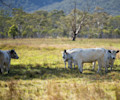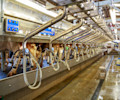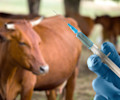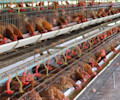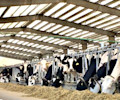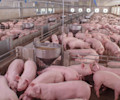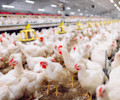On 11 April 2022, we are hosting a webinar that brings together experts in the field to discuss the rising risk of antimicrobial resistance (AMR) in light of our latest report, Industry Reinfected
The Organisation for Economic Co-operation and Development (OECD) highlights that the continued inappropriate use of antimicrobials in animal agriculture could lead to:
reduced food production;
reduced food security;
greater food safety concerns;
higher economic losses to farm households; and
contamination of the environment.
The continued overuse of antimicrobials in agriculture, along with the resulting antimicrobial waste, has serious ramifications for food security and food safety, which are then exacerbated by the effects of climate change. More frequent weather extremes, such as flooding, can have an impact on antimicrobial residue in the environment. Because of this, climate change coupled with the rising rates of antimicrobial resistance (AMR) is predicted to have serious consequences for global food security. All of the above have the potential to impact returns.
In February, the FAIRR Initiative published Industry Reinfected—an update to its 2020 report on emerging disease risk, An Industry Infected—looking at the extent to which animal protein producers have implemented the necessary precautions to prevent the occurrence of new diseases. The findings in this latest report indicate that 63% of companies continue to rank as “High Risk” when it comes to emerging disease risk, often due to a notable lack of disclosure and corporate policy.
Of the seven risk and opportunity factors considered (based on the Coller FAIRR Protein Producer Index) when writing Industry Reinfected, antimicrobial use is one where companies perform particularly poorly, with 64% operating at ‘High Risk’. The use of antimicrobials in animal agriculture is significant. Antimicrobials are used to maintain animal health and promote growth, especially in emerging markets. More legislation in recent years has meant that the use of antimicrobials in growth promotion is falling; however, the practice continues and has significant consequences for public health and the economy, both of which have substantial risks for investors.
Climate change will negatively impact an already serious problem
Awareness is growing around the impact that climate change will have on the spread of AMR. Maria Semedo, Deputy Director-General of the UN Food and Agriculture Organisation (FAO), recently commented that there is “no doubt” that climate change can exacerbate AMR, meaning that climate policies and effective AMR policies need to be developed in conjunction with one another.
The impact of climate change on AMR remains relatively unexplored, yet estimates suggest that a temperature increase of 10°C could increase AMR by 2-4%. Not only will there be direct implications for AMR due to an increase in temperatures, but also due to climate migration and an increase in extreme weather events, such as drought and flooding. Flooding, for example, can facilitate the spill-over of resistant bacteria (e.g., from sewers) into the environment.
The number of malnourished animals also tends to increase following a drought since animals are unable to receive adequate nutrition. In such cases, antimicrobials are often used to treat illnesses associated with malnutrition.
While climate change is largely considered an environmental issue, perspectives are starting to change. This 2022 IPCC report, for example, highlights that widespread use of antimicrobials can promote resistant infections, which increases the risk of new diseases emerging globally (p.2.40).
The use of antimicrobials in emerging markets shows no signs of abating and is actually increasing. According to a recent report, the burden of AMR is much higher in Sub-Saharan Africa and South Asia, with 23.7 deaths per 100,000 in Sub-Saharan Africa being directly attributed to AMR. The improper use of antimicrobials due to a lack of regulation is one of the reasons for this.
A growing health and financial burden for investors and governments
AMR, emerging diseases and pandemics all hold material risks to investors and can be exacerbated by climate change. The Task Force on Climate-related Financial Disclosures (TCFD) considers climate-related risks and opportunities are – or could become – material for most organisations, as well as investors. The four recommendations issued by the TCFD apply to financial-sector organisations and play an important role in enabling investors to influence the disclosure of climate risk from organisations in which they have invested.
FAIRR has already engaged in this work via the development of the Coller FAIRR Climate Risk Tool, which analyses 40 of the world’s largest animal protein companies according to a 2-degree warming scenario. The tool takes data from the Coller FAIRR Protein Producer Index and highlights that companies operating at “High Risk” will have negative profitability, as impacted by rising temperatures.
Disclosure of company practices is necessary for investors to accurately assess the level of risk associated with investments. Frameworks like the TCFD promote transparency around company practices, enabling key stakeholders to engage and demand better practices. The materiality of climate change is significant, and with concerns over rising AMR and emerging disease risk, the importance of implementing frameworks like TCFD is more critical now than ever before.
Guidelines are essential for companies in helping them understand how and where antimicrobial stewardship should be improved. Improving animal welfare can subsequently reduce or remove the need for antimicrobials, ensuring that the antimicrobials in circulation remain effective and curative.
Indeed, the public health and material risks of AMR are significant. Industry Reinfected underscores why pandemic prevention must stay high on the agenda for policymakers, especially as we have all witnessed the impacts of emerging diseases on food security and food safety. As we begin to adjust to life with COVID-19, the prevention of a new disease or resistant bacteria is paramount to public health and financial stability.
FAIRR insights are written by FAIRR team members and occasionally co-authored with guest contributors. The authors write in their individual capacity and do not necessarily represent the FAIRR view.
Written by


